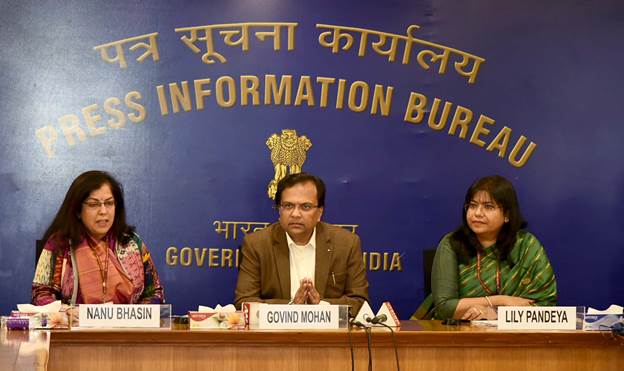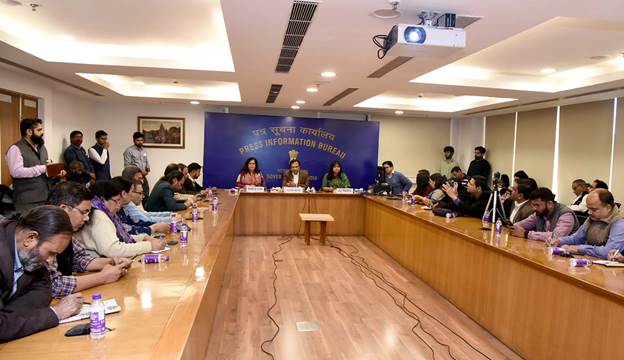The First G20 Culture Group (CWG) meet to be organised in Khajuraho, Madhya Pradesh from 22nd to 25th February 2023.
Ministry of Culture
India’s G20 Culture Track is predicated on the idea of ‘Culture for LiFE’- environmentally conscious lifestyle as a campaign for sustainable living: Culture Secretary , Sh Govind Mohan
Posted On:
15 FEB 2023 7:06PM by PIB Delhi
Ministry of Culture is organising the First G20 Culture Group (CWG) meet in Khajuraho, Madhya Pradesh from 22nd to 25th February 2023.

Briefing the media about the upcoming First G20 Culture Group (CWG) meeting , Secretary Culture Shri Govind Mohan said , “India is so rich and diverse in culture that the cultural engagements acquire their own significance and importance. The overarching theme of G20 is that of “Vasudev Kutumbakam”- One Earth · One Family · One Future’. Ministry of Culture has developed a robust programme of cultural projects inspired by India’s G20 theme of “Vasudev Kutumbakam”. The Secretary further explained that India’s G20 Culture Track is predicated on the idea of ‘Culture for LiFE’- environmentally conscious lifestyle as a campaign for sustainable living.
Shri Govind Mohan also said that the Culture Working group will have four meetings and they will be held in Khajuraho, Bhubaneshwar, Hampi and the final location, is yet to be decided. He also informed that for Khajuraho, the theme is “Protection and Restitution of Cultural Property”.
Secretary Culture also added , “This cultural working group meeting in Khajuraho will also have an exhibition which will be organized at the Maharaja Chhatrasal Convention Centre, which will be inaugurated by Union Minister for Culture Sri G Kishan Reddy along with the Chief Minister of Madhya Pradesh, Shri Shivraj Chouhan”.
Shri Govind Mohan informed that cultural programs will be organised on the occasion including the Khajuraho Dance Festival Cultural performances . The delegates will also visit the Western Group of Temples, which is a UNESCO World Heritage Site. They will also be taken to Panna Tiger Reserve. More than 125 delegates will attend the meeting.

An ancient city, Khajuraho is known for its majestic temples and elaborate sculptures. A UNESCO World Heritage Site, the Khajuraho Group of Monuments, was constructed by the Chandela Dynasty between 950-1050 AD.
The aesthetic of the Nagara-style architecture, ornamented with the intricate and detailed sculptures, acts like a window into the socio-cultural practices of the time. According to historical records, there were 85 temples in the temple site in Khajuraho, covering 20 square kilometres, in the 12th Century AD. However, today, only 25 of these temples – scattered throughout a 6 square kilometre area – have survived.
As a part of the meeting, there will be an exhibition titled “Re(ad)dress : Return of Treasures” at the Maharaja Chhatrasal Convention Centre (MCCC), which will be inaugurated by the Chief Minister of Madhya Pradesh Shri Shivraj Chauhan and the Minister for Culture, Tourism and DoNER Shri G. Kishan Reddy.
India assumed the G20 presidency on 1 December 2022, articulating the theme of ‘Vasudhaiva Kutumbakam’ – ‘One Earth · One Family · One Future’. The philosophy draws from the Maha Upanishad, an ancient Indian Sanskrit text, affirming the value of all life – human, animal, and plant – and their interconnectedness on the planet Earth and in the wider universe. With its spirit rooted in the idea of inclusiveness, universal welfare, and harmony among all beings, it is premised on the belief that all individuals are collectively responsible towards each other and their shared future. ‘Vasudhaiva Kutumbakam’ aims to foster, celebrate, and incorporate the diversity of cultural traditions amongst the member states while striving towards holistic living and creating a pro-people planet.
The CWG will evolve through four meetings in four historic cities of India and steer the G20 discourse on four priority areas. India’s CWG will reflect the emergence of Culture as a prominent theme on the global stage, it will adopt ‘Culture’ to renew multilateral and multicultural cooperation at all levels and will aim to forward this ideal and inform future global cultural policies and initiatives.
Four priority areas of India’s CWG include Protection and Restitution of Cultural Property;Harnessing Living Heritage for a Sustainable Future; Promotion of Cultural and Creative Industries, and Creative Economy;Leveraging Digital Technologies for Protection and Promotion of Culture.
To engage with these priorities further, the CWG has also developed a robust year-long program of cultural projects such as exhibitions, immersive experiences, symposiums, seminars, art residencies, workshops, publications, etc.
******
NB/SK